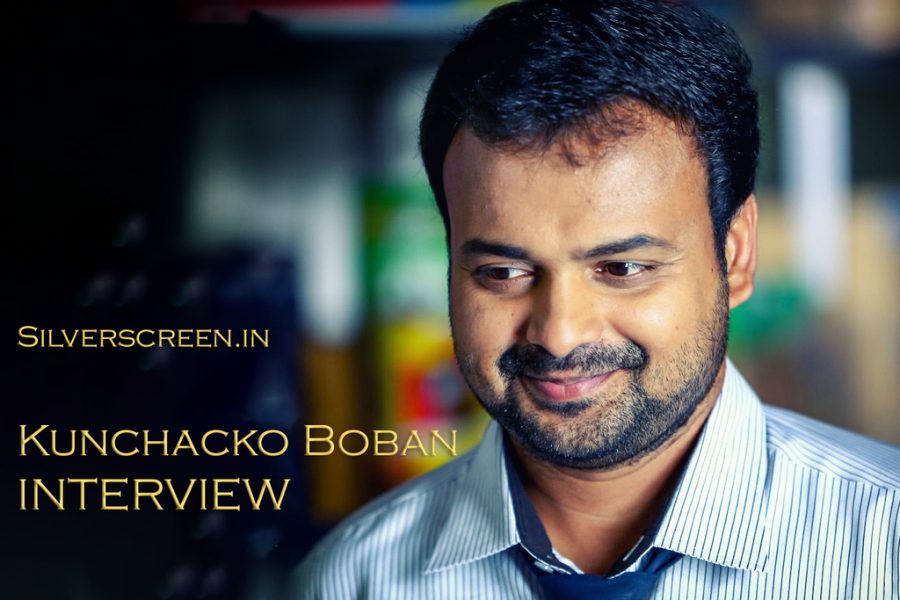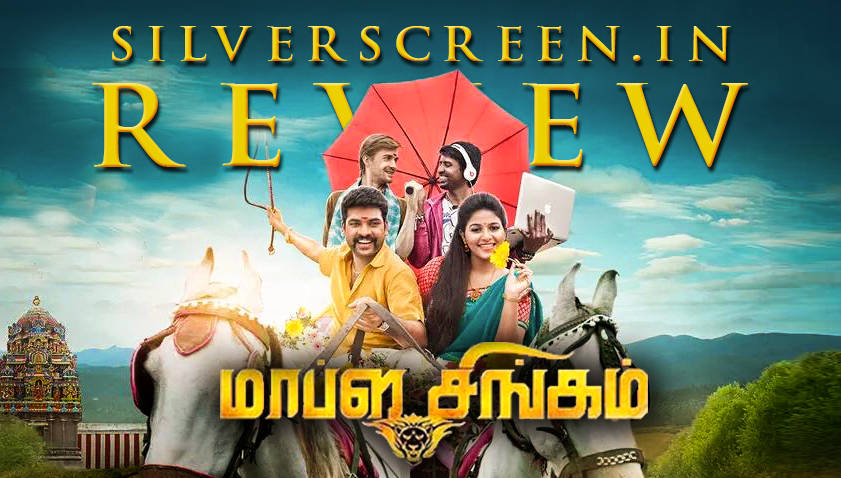When we speak, Kunchacko Boban is on the sets of Anil Radhakrshna’s Diwanjimoola Grandprix, a comedy drama in which he’s playing the lead role. For a film set, it’s unusually quiet in the background. “I’ll be flying to Dubai today after shoot,” he says. The next day, his Facebook page – with more than a million followers, has a post from the event that he had attended. A picture with singer Yesudas who also appears to have joined Chakkochan for Emirates’ ‘Walk For Autism’ in Dubai.
*****
“Are you scared of growing old?” is one of the first questions I pose to Kunchakkko Boban during our conversation. He laughs, and says he is not. “I was always prepared. I am fully aware of the fact that I am not a chocolate hero anymore.”
A scion of the Alappuzha-based family that founded and run Udaya Studios, one of the oldest film production houses in the country, Kunchakko Boban’s film entry was destined to happen. It was through his family friend Fazil’s sugary romantic drama, Aniyathipraavu in 1997, that he began his career.
Aniyathipraavu became a huge commercial success, and was followed by films like Nakshathrathaarattu, Niram and Mayilpeelikkavu, which made Chakkochan one of the most successful Mollywood stars in late 90s and early 2000s. He was a teenage idol. The Hero Splendor bike that he used in Aniyathipraavu became a rage among the youth, and his face was on every magazine cover, school name-slips and slam-books. As legend has it, every week, the postal department would bring to his family house in Alappuzha letters from his female fans in gunny-bags.
“I was at the peak of my career when I was in my twenties. I played roles which required me to roam around on a stylish motorbike, dance to romantic tunes… I took a break from cinema when I finally got tired of it,” he says.
The actor, after starring in a number of mediocre romantic dramas, vanished from the industry in 2005, only to reemerge in 2008 with films like Traffic, Take Off, Ordinary and Vettah.
“When I finally returned to cinema, I was determined to choose roles more wisely. I wanted to reinvent myself as an actor. Not as a star. It’s paying off. Now I play smaller roles – character roles, and those with negative shades. This part of my career is more creatively satisfying. Age isn’t a barrier for the actor that I am. I have already tamed my age.”
*****
Diwanjimoola is a nondescript place that lies behind a railway station in Thrissur. The film, written by Prasanth Nair IAS, former collector of Kozhikkode, is about the cultural and social scenes in Thrissur, and about the famous bike-racing festival in the region.
“It’s a lighthearted film,” says Chakkochan. “I play Sajan Joseph, an IAS officer…”
A character that’s quite reminiscent of the one he played in Lohithadas’s State Award winning film, Kasthoooriman. Chakkochan was an IAS officer in the film, who was also curiously named Sajan Joseph Alukka.
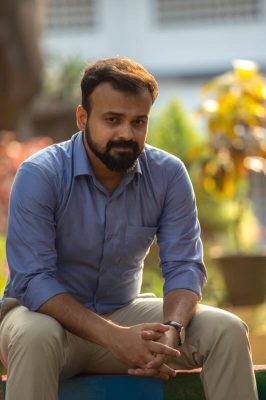
“It’s not a spin-off,” he assures, “Sajan comes to Thrissur on his first job posting, The film is about how he handles the issues and complaints that come to him. Prasanth wrote the script with a personal touch, although you can’t say it’s biographical. Sajan is not called ‘Collector Bro’, which is how Prasanth is known across the state (laughs). He was on the sets to help me with the character,” Chakkochan says, “This is the first time I am playing an IAS officer on screen.”
In Kasthooriman, he had worked towards becoming one. The 2003 movie, also starring Meera Jasmine, was a box-office hit. Chakkochan’s last release, Take Off, a multi-starrer, was a critical and commercial success as well. But the ones that had released earlier weren’t well-received.
“A lot of films that I was confident about bit the dust at box-office,” Chakkochan recalls, “I try to move on. I don’t want to lie that failures don’t affect me. I’d rather look straight than stare at the rear-view mirror.”
Silverscreen: But, there must have been a time when a movie that you felt good about failed to attract distributors or didn’t get marketed well.
Chakkochan: To blame a film’s failure on marketing and distribution is bad excuse. Ultimately, a film wins the box-office if it is good. I believe that the biggest publicity is by word-of-mouth. For instance, Vellimoonga had a very low profile at the time of its release. It was only after the initial couple of days that the film started to draw crowds. Of course, it is not the same about all the films. Sometimes, careful and intelligent marketing can change the fate of a film. But to blame a film’s failure on poor marketing isn’t fair.
Having revived your home production company, Udaya Studios last year, with Kochouvva Paulo Ayyappa Coelho, how many scripts do you listen to in a day, really?
I usually dedicate a whole day to listen to a script, if I feel it has got the potential. Sometimes, I listen to a bad script and ruin my entire day (laughs). I don’t usually listen to scripts during shoot. It’s not something you should do in haste.
I had been looking for the right script to re-launch Udaya. It was a relatively small film, with a simple and sweet subject. It gave me decent returns and immense goodwill. I am happy with that. I want to produce an out-and-out commercial film next. A big budget film with sensible content. I make it a point to avoid sexist, double meaning dialogues in my films, as an actor and as a producer. Even if I don’t mention it in my contract, the people who work with me avoid such things since they know the kind of person I am, and the kind of characters I play the best.
You are also known to be a good businessman.
I am not sure what your definition of a good businessman is (laughs). I am misunderstood to be good at business, but in fact, I am not. On the contrary, I am an emotional overload, sometimes. I have been able to do well in the field of real estate due to sheer luck, I would say. I cry at films. Sometimes, a lot that my wife teases me.
Your character in How Old Are You was an utterly sexist and selfish husband. In Traffic and Vettah, you were a shrewd murderer… and yet, despite the number of other roles that you have done, only the not-so-nice ones were appreciated.
My character in How Old Are You is quite the opposite of what I am in real life. A man who is mean to his wife, and treats her with contempt and jealousy when she is on the verge of achieving something. After I finished dubbing for the film, I told Rosshan Andrews that Rajeev didn’t sound like me at all. It surprised me that I could pull off that character. But ultimately, that’s what actors are supposed to do, right? Cinema is team work. I am glad that such characters, of great depth and possibilities, are coming to me these days. In those two movies, the characters were well-appreciated because the films were good.
Does acting still excite you, after 20 years in the industry?
Yes, of course. I get to meet new people, work in a new place, and be a new character with every new film. Other professions do not offer such fine opportunities. You get to live your dream. Every day is an exciting day. That’s one reason why actors stay young longer than others.
In Take Off, one of the most critically acclaimed Malayalam films in recent time, you played a male nurse named Shahid. Your character was secondary, while Parvathy played the protagonist. Reports say that you did not want any compensation for working on the film.
Take Off was for my friend, (late) Rajesh Pillai. I didn’t mind working for no compensation in his film because he has done much bigger things for me. Some of the best roles that I have done in the second phase of my career were in films centred around a woman. Lal Jose’s Elsamma Enna Aankutty broke my image as an urbane romantic hero. I played a simple milkman living in an Idukki village. My characters in Kasturimaan and How Old Are You were secondary roles. Those films belonged to Meera Jasmine and Manju Warrier (respectively). I am not averse to working in films that do not treat me as a hero.
What really happened with Roman? Producer Arun Ghosh had accused you of trying to interfere in the production of the film, and also demanding a huge sum of money in addition to your remuneration.
It’s still in the court, so I can’t speak anything about it. The people with whom I have worked so far would corroborate that I am not a person the other party project has me to be. Every director I have worked with has wanted to work with me again.
Do you have a favourite genre of films?
As an ordinary member of the audience, I love comedy. My favourite kind of films are light-hearted, fun films that help me relax. I guess that’s what a majority of the audience look for. Take Off, in spite of being an excellent film, might not collect from the box-office the sum that a film like Pullippuliyum Aattinkuttiyum earned. The film garnered great reviews.
As a producer, I want to produce films that I love to watch. Sensible and humorous films that would help the audience forget the stressful reality for sometime.
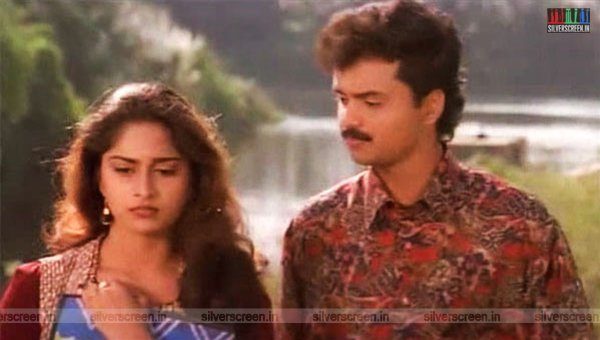
Have you ever tried re-watching your old films like Aniyathyipraavu and Niram?
Yes. I watch them sometimes when I am alone. It’s embarrassing (laughs). I know I wasn’t good enough. I could have played those roles way better. It’s not a secret that I used to be a mediocre actor.
Mid-2000s were a hard time for you, with films failing back to back. And, you vanished from the industry in 2005.
Experience counts, right? The things I have learned and experienced in my personal life have helped me mature as an actor. I think I have become more professional. I am able to understand my characters in a better way than before. I get involved in script discussions, sometimes right from its inception. Hard work has helped me in a big way. There were people who said I couldn’t do humour. It was difficult for me initially, but over the years, I proved them wrong. In films like Pullippuliyum Aattinkuttiyum, Romans and Ordinary, I pulled off humour, quite successfully. Now, my thrill is in taking up roles that I wouldn’t have dared to pick up a decade ago, and delivering them well. I would like to work with people with diverse tastes – like Rajeev Ravi, for instance, who creates raw, realistic characters I have rarely played before.
You were a part of Traffic, the movie that pioneered the so-called new generation cinema in Malayalam. Being a person who started his career in 90s, how does it feel to be a part of the new generation of Malayalam cinema?
Malayalam cinema is way different from what it used to be in the 90s, as you can see. I was lucky enough to be a part of many important films which can be regarded as milestones. Like Traffic, and now, Take Off. Thus, I am able to keep pace with the changes in Mollywood. The level of perfection in the scripting, acting and production departments of Take Off are of international standards. It was a learning experience for me. I am lucky to be offered opportunities to reinvent myself at this stage in my career.
Ramante Eden Thottam was shot in a span of 27 days. Take Off was shot in less than 55 days. What made it possible?
Take Off is even bigger an achievement than Ramante, considering the scale of the movie. Usually, the film would have taken 90 days or more. If we could wrap that up in 55 days, completing a much smaller movie like Ramante Eden Thottam in two weeks is a much smaller feat. It unfolds in just a couple of locations, narrates a lighter subject, with a small cast.
If the director is sure about what to shoot and what not to shoot, it’s not a difficult task to wrap up a movie without much delay. Mahesh was such a filmmaker and scriptwriter. That he is also a seasoned editor came as an advantage. Same goes for Ranjith Shankar, although his style of filmmaking is different.
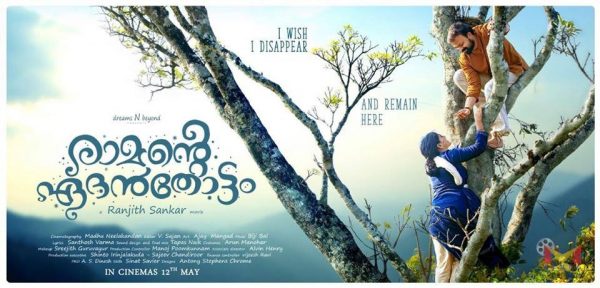 Ramante Eden Thottam is about sustainable living. My character, Raman, is a man in his forties, who runs a beautiful resort in a mountain. The film revolves around the characters who visit this resort, and their life and their takeaways from this serene space. What urban life does to people and their personal relationships is also discussed in the film. It will be one of the best works of veteran cinematographer Madhu Neelakantan. Madhu chettan loves forests and mountains. He would effortlessly climb the rocks, trek through the toughest routes with his camera. He was excited, and that has reflected in the film’s camerawork too. His work in Ramante Eden Thottam will be drastically different from that of Annayum Rasoolum or Kammattippadom.
Ramante Eden Thottam is about sustainable living. My character, Raman, is a man in his forties, who runs a beautiful resort in a mountain. The film revolves around the characters who visit this resort, and their life and their takeaways from this serene space. What urban life does to people and their personal relationships is also discussed in the film. It will be one of the best works of veteran cinematographer Madhu Neelakantan. Madhu chettan loves forests and mountains. He would effortlessly climb the rocks, trek through the toughest routes with his camera. He was excited, and that has reflected in the film’s camerawork too. His work in Ramante Eden Thottam will be drastically different from that of Annayum Rasoolum or Kammattippadom.
I know him from the time he was working as an assistant cameraman in my film, Ingane Oru Nilapakshi. When people refer to him as a veteran, I am reminded of all the time that has passed. It’s a great feeling, nevertheless, to work with people you started out with. We have a lot of subjects to talk about, and are very much in sync.
Are you an introvert in real life?
I am definitely not an extrovert. I don’t enjoy crowds much. But I am easy-going enough to not be bothered by crowds on film sets. Even in the beginning of my career, when I was 20, I really enjoyed being the centre of attention. The letters, fanfare and media attention never bothered me. I never let cinema and the celebrity status affect my personal life negatively. When I felt I had reached a saturation point in cinema, I took a break. I could afford to do that.
Also, I manage my social media account. I enjoy being in touch with the audience. But I would prefer to have a more active social life offline than online. Life isn’t something that I can contain in a few words posted online.
Would you have been an actor if you weren’t born into the Udaya family?
I don’t know. It was my family friend, ace director Fazil, who gave me my first film, Aniyathipraavu. I wasn’t very keen about cinema when I debuted. I never thought I would last as an actor. But when I returned to cinema after that break, I really wanted to be an actor.
It’s true that film artistes work in an atmosphere of insecurity. You lose a few films in a row and the industry forgets you. There are people who enter the field looking for monetary benefits and a glamorous lifestyle. They display this insecurity even more. But if you are financially sound and well invested, you could live happily, doing the films that make you happy as an artiste.
Do you feel positive about the way Malayalam cinema is evolving?
Recommended
Yes, I guess. Filmmakers embark on a project with a better planning, these days. They are trying to bring a lot of realism into the making, which is interesting. The influence of theatre is slowly fading. The young directors are trying to take the films to a national platform, screening the films in Mumbai and further north. Things are looking great.
My all-time favourite films, however, are from the bygone era. Amaram, Kireedom and Moonnam Pakkam. And, I love Udaya’s commercial films like Palattu Koman. The craft and techniques that the directors and technicians used those days, in the black and white era, never cease to amaze me. The finesse that people like Vincent Master brought to their films is something you wouldn’t get to see even in the films from the current generation.
Watch the film Gandharva Kshethram to know what I am talking about. With the help of out-of-the-world lighting and camera work, Vincent Master made Prem Nazir look like a celestial figure. This happened, I guess, because the technicians of those times were basically artistes who wanted to create art. Director Bharathan debuted through Gandharva Kshethram, as an art director. Ultimately, it’s art that we are trying to create, not a commodity we market and sell.
Boban’s Ramante Eden Thottam releases May 12.
*****
The Kunchacko Boban interview is a Silverscreen exclusive.
